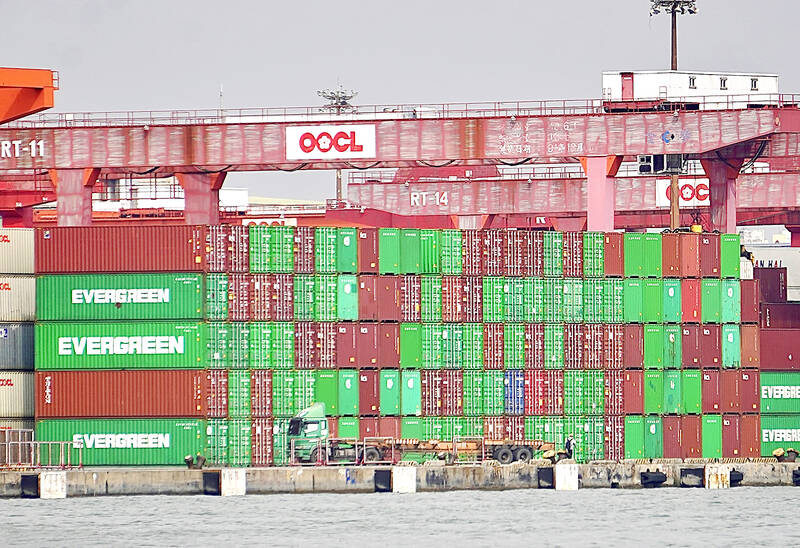Exports last month increased a modest 3.5 percent year-on-year to US$37.36 billion, as shipments of electronics used in artificial intelligence (AI) remained strong and some non-tech products came out of the woods, the Ministry of Finance said yesterday.
The increase lagged behind the 7 to 10 percent range the ministry expected, as firms at home and abroad largely maintained a cautious business approach, but their inventory mostly returned to healthy levels and the global economy is improving, Department of Statistics Director-General Beatrice Tsai (蔡美娜) said.
There is a lingering uneven recovery between product categories and export destinations — with exports of information and communication technology (ICT) products to the US driving most of the growth, helped by aggressive spending of US technology giants on AI infrastructure, she said.

Photo: CNA
The megatrend explained why ICT shipments such as AI servers and graphics cards surged 62.4 percent to US$9.42 billion, underpinning 25.2 percent of overall shipments, Tsai said.
Meanwhile, exports of electronics, mainly chips, shed 11 percent to US$13.4 billion, she said, adding that the retreat in electronics likely had to do with the reclassification of partial exports as imports to reflect changes in manufacturing locations.
It is better to combine electronics and ICT shipments to gain a better picture, as the two categories made up 64 percent of total exports and made a solid gain in the first five months of this year, she said.
Taiwan Semiconductor Manufacturing Co’s (TSMC, 台積電) robust revenue lent support to such an interpretation, Tsai said.
TSMC yesterday posted NT$229.62 billion (US$7.12 billion) of revenue for last month, a 30.2 percent spike from a year earlier.
Shipments of optical and precision products plunged 31.2 percent to US$892 million, while exports of transportation tools shrank 25 percent to US$880 million, the ministry’s report showed.
On the other hand, some non-tech products emerged from a slowdown, as customers started to rebuild inventory, Tsai said.
Exports of plastic grew 0.6 percent, while chemical and mineral products saw a growth 8.9 percent, the ministry said.
Shipments of textile products bounced 10.2 percent, given the demand for sportswear for the upcoming Olympic Games, she said.
Imports increased 0.6 percent to US$31.31 billion, giving Taiwan a trade surplus of US$6.05 billion, which is 21.6 percent higher than a year earlier, the ministry said.
Imports of agricultural and industrial raw materials picked up 5.8 percent, while imports of semiconductor equipment and luxury products declined 11.4 percent and 10.7 percent each, it said.
In the first five months, exports expanded 9.1 percent to US$185.14 billion and imports rose 3.2 percent to US$153.69 billion, it said.

SEMICONDUCTORS: The German laser and plasma generator company will expand its local services as its specialized offerings support Taiwan’s semiconductor industries Trumpf SE + Co KG, a global leader in supplying laser technology and plasma generators used in chip production, is expanding its investments in Taiwan in an effort to deeply integrate into the global semiconductor supply chain in the pursuit of growth. The company, headquartered in Ditzingen, Germany, has invested significantly in a newly inaugurated regional technical center for plasma generators in Taoyuan, its latest expansion in Taiwan after being engaged in various industries for more than 25 years. The center, the first of its kind Trumpf built outside Germany, aims to serve customers from Taiwan, Japan, Southeast Asia and South Korea,

Gasoline and diesel prices at domestic fuel stations are to fall NT$0.2 per liter this week, down for a second consecutive week, CPC Corp, Taiwan (台灣中油) and Formosa Petrochemical Corp (台塑石化) announced yesterday. Effective today, gasoline prices at CPC and Formosa stations are to drop to NT$26.4, NT$27.9 and NT$29.9 per liter for 92, 95 and 98-octane unleaded gasoline respectively, the companies said in separate statements. The price of premium diesel is to fall to NT$24.8 per liter at CPC stations and NT$24.6 at Formosa pumps, they said. The price adjustments came even as international crude oil prices rose last week, as traders

Taiwan Semiconductor Manufacturing Co (TSMC, 台積電), which supplies advanced chips to Nvidia Corp and Apple Inc, yesterday reported NT$1.046 trillion (US$33.1 billion) in revenue for last quarter, driven by constantly strong demand for artificial intelligence (AI) chips, falling in the upper end of its forecast. Based on TSMC’s financial guidance, revenue would expand about 22 percent sequentially to the range from US$32.2 billion to US$33.4 billion during the final quarter of 2024, it told investors in October last year. Last year in total, revenue jumped 31.61 percent to NT$3.81 trillion, compared with NT$2.89 trillion generated in the year before, according to

PRECEDENTED TIMES: In news that surely does not shock, AI and tech exports drove a banner for exports last year as Taiwan’s economic growth experienced a flood tide Taiwan’s exports delivered a blockbuster finish to last year with last month’s shipments rising at the second-highest pace on record as demand for artificial intelligence (AI) hardware and advanced computing remained strong, the Ministry of Finance said yesterday. Exports surged 43.4 percent from a year earlier to US$62.48 billion last month, extending growth to 26 consecutive months. Imports climbed 14.9 percent to US$43.04 billion, the second-highest monthly level historically, resulting in a trade surplus of US$19.43 billion — more than double that of the year before. Department of Statistics Director-General Beatrice Tsai (蔡美娜) described the performance as “surprisingly outstanding,” forecasting export growth